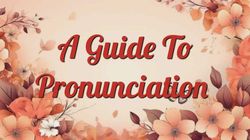Aug 24, 2024
A Guide To Pronunciation



A Guide To Pronunciation
Hey everyone! Today, we are going to talk about pronunciation.
We’re going to give you some rules to help you figure out how to pronounce a word based on its spelling.
First we should know the consonants and vowels
Vowels:
A, E, I, O, U
Consonats:
B, C, D, F, G, H, J, K, L, M, N, P, Q, R, S, T, V, W, X, Y and Z
So in English we have five vowel letters, or maybe six.
We’re going to talk about five vowel letters.
A E I O U (Sometimes Y)
Each of these vowel letters have two main sounds. One is the long sound and the other one is the short sound.
Long Vowel
Sounds like the name of the letter.
Has a long sound.
The long sound
A = 'ei' as in 'cake'
E = 'i' as in 'keep'
I = 'ai' as in 'bike'
O = 'ou' as in 'home'
U = 'yu' as in 'cute'
Short Vowel
Sounds different than the letter.
The most common vowel sound.
The short sound
A = 'ah' as in 'apple'
E = 'eh' as in 'egg'
I = 'ih' as in 'insect'
O = 'awe' as in 'bog'
U = 'uh' as in 'tug'
Rule 1: One Vowel Rule (CVC) - Vowel sound is short
Examples:
Cap = short a
Set = short e
Bin = short i
Cot = short o
Cut + short u
Rule 2: Magic E (CVC + silent E) - Vowel sound is long
Examples:
Hate = long a, silent e
Pete = long e, silent e
Bite = long i, silent e
Hope = long o, silent e
Cute = long u, silent e
Rule 3: Two Vowel Rule (CVVC) - Vowel sound is long.
When two vowels go walking, the first does the talking.
Examples:
Stain = long a, silent i
Tree = long e, silent e
Soap = long o, silent a
A Guide to Pronunciation
Words with the "ai"
The "ai" sound in English can be tricky because it's not always pronounced the same way. It can sound like the long "a" sound (as in rain) and the short "e" sound (as in said)
Here's a breakdown of words with the "ai" sound, categorized by their pronunciation:
1. Long "a" Sound (like "rain")
Sample Words:
- rain, wait, train, paint, plain, chain, gain, snail, tail, fail, sail, mail, pail, wail,
- braid, bait, afraid, air, chair, fair, hair, lair, pair, stair
2. Short "e" Sound (like "said")
Sample Words:
- said, plaid, again,
Important Note:
- Many words with "ai" have a long "a" sound, but it's essential to be aware of exceptions and the other pronunciations as well.
- The context of the word within a sentence can often provide clues to its pronunciation.
- Consulting a dictionary is always a reliable way to determine the correct pronunciation of a word.
Words with “ee””
Words with "ee" that typically sound like the long "e" sound:
Sample Words:
- See, free, bee, feet, meet, feel, deep, sleep, keep, sweep, week, feed, need, seed, green, screen
Important Note:
While "ee" typically sounds like the long "e" sound, there are some exceptions. For example, in the word "been," the "ee" sounds like the short "i" sound. Always refer to a dictionary if you're unsure about the pronunciation of a word.
Words with the “ay”
Words with "ay" that sound like the long "a" sound:
Sample Words:
- Play, stay, say, day, way, may, lay, pay, hay, pray, slay, tray, bay, clay, gray, lay
Important Note:
Remember that the pronunciation of "ay" can vary depending on the context of the word. It's always a good idea to check a dictionary if you're unsure about the pronunciation.
Words with “ea”
Words with "ea" that can have different pronunciations based on the context:
• Common Words with "ea" pronounced as "ee":
- Sea
- Tea
- Beam
- Dream
- Team
- Cream
- Steam
- Leaf
- Peace
- Mean
• Common Words with "ea" pronounced as "eh":
- Bread
- Dead
- Thread
- Head
- Sweat
- Tread
- Spread
- Breakfast
• Common Words with "ea" pronounced as "ay":
Great
Break
Steak
Important Note:
The pronunciation of "ea" in English can vary, so it's essential to consider the context of the word when determining how it should be pronounced.
Words with “ie”
Words with "ie" that typically sound like the long "i" sound:
Sample Words:
- Lie
- Tie
- Pie
- Die
- Fie
Important Note:
- While "ie" typically sounds like the long "i" sound, there are some exceptions. For example, in the words "friend" and "chief," the "ie" sounds like the short "i" sound.
- The pronunciation of "ie" can also be influenced by the surrounding letters.
- Always refer to a dictionary for the correct pronunciation of a word.
Remember that English pronunciation can be tricky, but with practice and a little attention to detail, you can master the sounds of "ie" and many other vowel combinations.
Words with “oe”
Words with "oe" that typically sound like the long "o" sound:
Sample Words:
- Toe
- Hoe
- Joe
- Doe
- Foe
- Roe.
Important Note:
- The "oe" digraph is relatively uncommon in English, and it often sounds like the long "o" sound.
- There are very few exceptions to this rule.
- The pronunciation of "oe" can also be influenced by the surrounding letters.
- Always refer to a dictionary for the correct pronunciation of a word.
Remember that English pronunciation can be tricky, but with practice and a little attention to detail, you can master the sounds of "oe" and many other vowel combinations.
Words with “ou”
Words with "ou" that typically sound like the long "aw" sound:
Sample Words:
- House
- Mouse
- Out
- About
- Shout
- Cloud
- Count
- Hound
- Round
- Sound
- Proud
- South
- Doubt
- Found
- Ground
Important Note:
- While "ou" typically sounds like the long "aw" sound, there are a few exceptions. For example, in the words "could," "would," and "should," the "ou" sounds like the short "u" sound.
- The pronunciation of "ou" can also be influenced by the surrounding letters.
- Always refer to a dictionary for the correct pronunciation of a word.
Remember that English pronunciation can be tricky, but with practice and a little attention to detail, you can master the sounds of "ou" and many other vowel combinations.
Words with “oi”
Words with "oi" that typically sound like the "oy" sound:
Common Words:
- Coin
- Join
- Point
- Noise
- Voice
- Choice
- Soil
- Toil
- Spoil
- Foil
- Moist
- Loin
- Broil
- Poise
- Boil
- Coil
- Enjoin
- Ointment
- Recoil
- Toil
- Void
Important Note:
- The "oi" digraph is relatively uncommon in English, and it often sounds like the "oy" sound.
- There are very few exceptions to this rule like the word.
- The pronunciation of "oi" can also be influenced by the surrounding letters.
- Always refer to a dictionary for the correct pronunciation of a word.
Remember that English pronunciation can be tricky, but with practice and a little attention to detail, you can master the sounds of "oi" and many other vowel combinations.

When to Pronounce "C" as "K" and “S”
The pronunciation of the letter "C" in English can be tricky because it has two main sounds:
- "K" sound: as in "cat," "car," "come"
- "S" sound: as in "city," "cent"
Here's a breakdown of when "C" is pronounced as "K":
- Before the vowels A, O, and U:
- Examples: cat, coat, cup
- Before the consonants L, R, and T:
- Examples: clean, crab, act
Important Note:
It's important to note that there are exceptions to these rules. For example, the word "scented" has a "S" sound for the "C" even though it comes before a vowel.
Learning through practice and memorization is key to mastering these rules.
When to Pronounce “CH” as “CH”, “K” and “SH”
The letter combination "CH" in English can have three main pronunciations:
1. "CH" sound: as in "chair," "cheese," "child"
2. "K" sound: as in "school," "character," "echo"
3. "SH" sound: as in "machine," "chef," "champagne"
Here's a breakdown of when "CH" is pronounced each way:
"CH" Sound:
- This is the most common pronunciation of "CH" and is used in a wide variety of words.
- It often occurs before the vowels A, O, and U.
- Examples: chair, choose, church
"K" Sound:
- This pronunciation is often found in words of Greek or Latin origin.
- It usually occurs before the vowels E, I, and Y.
- Examples: school, chaos, technical
"SH" Sound:
- This pronunciation is often found in words of French origin.
- It often occurs before the vowels E, I, and Y.
- Examples: machine, chauffeur, niche
Important Note:
- There are exceptions to these rules, and some words may have different pronunciations depending on their origin or usage.
- For example, the word "orchid" has a "K" sound, but the word "arch" has a "CH" sound.
Learning through practice and memorization is key to mastering these rules.
When to Pronounce “G” as “G” and “J”
The letter "G" in English has two main pronunciations:
- "G" sound: as in "gate," "go," "good"
- "J" sound: as in "gem," "gentle," "giraffe"
Here's a breakdown of when "G" is pronounced each way:
"G" Sound:
- Before the vowels A, O, and U:
- Examples: gate, go, gun
- Before the consonants L, R, and T:
- Examples: glad, green, get
- At the end of a word:
- Examples: big, dog, rug
"J" Sound:
- Before the vowels E, I, and Y:
- Examples: gem, giant, gym
Important Note:
- "G" can sometimes have a "G" sound even before E, I, and Y. This is usually in words with a digraph, like "get" and "give"
Learning through practice and memorization is key to mastering these rules.
When to Pronounce “S” as “S” and “Z”
The letter "s" can sound like "z" in English when it comes before a voiced sound.
Here's a breakdown:
Voiced Sounds: These sounds are made with your vocal cords vibrating.
Examples include:
- Vowels: a, e, i, o, u
- Consonants: b, d, g, j, l, m, n, r, v, w, y, z, th (as in "this")
Unvoiced Sounds: These sounds are made without your vocal cords vibrating.
Examples include:
- Consonants: p, t, k, f, h, s, sh, ch, th (as in "thin")
Voiced sound examples:
- "s" sounds like "z" before a voiced sound:
- "s" before a vowel:
"rose" (pronounced "roze"), "easy" (pronounced "ee-zee")
- "s" before a voiced consonant:
"dogs" (pronounced "dogz"), "has" (pronounced "haz")
Unvoiced sound examples:
- "s" sounds like "s" before an unvoiced sound:
“Sharp”
- "s" before an unvoiced consonant:
"cats" (pronounced "cats"), "frost" (pronounced "frost")
Important Note:
This rule is a general guideline, and there are some exceptions. This is due to historical pronunciation shifts in the English language.
Here are some examples of words where the letter "s" is pronounced like "z":
- Before vowels:
- rose
- easy
- music
- design
- reason
- vision
- usual
- Asia
- Before voiced consonants:
- dogs
- bags
- has
- says
- his
- this
- those
- please
- Other examples:
- is (pronounced "iz")
- was (pronounced "waz")
- because (pronounced "bee-cuz")
- desire (pronounced "di-zire")
- measure (pronounced "me-zher")
Remember, this is just a sample, and there are many more words where "s" is pronounced as "z".
Here are some examples of words where the letter "s" is pronounced as "s":
1. Before unvoiced consonants:
- cats
- frost
- best
- street
- skate
- stop
- class
- ask
2. At the end of a word:
- bus
- kiss
- dress
- grass
- loss
- news
- house
3. In some words before vowels, but not all:
- sister
- snake
- school
- smile
- story
- sky
Keep in mind that these are just a few examples, and there are many more words where "s" is pronounced as "s". The best way to learn how to pronounce words correctly is to practice and listen carefully.

Learning the Sounds
- Practice: Practice saying words with "v" and "w" out loud to get a feel for the differences in pronunciation.
- Listen carefully: Pay attention to how native speakers pronounce words with "v" and "w" to improve your own pronunciation.
By understanding the sounds of "v" and "w", you'll be able to decipher their use in words and pronounce them confidently.
V and W: Exploring Sounds and Words
The letters "v" and "w" present interesting contrasts in English pronunciation. Let's delve into their sounds and how they are used in words:
"V" Sound
- Sound: The "v" sound is a voiced labiodental fricative. This means you create the sound by placing your upper teeth against your lower lip and then exhaling air. Your vocal cords vibrate while making this sound.
Examples:
very, voice, value
vision, very, very
love, have, save
"W" Sound
- Sound: The "w" sound is a voiced labiovelar approximant. This means you create the sound by rounding your lips and raising the back of your tongue towards the soft palate. Your vocal cords vibrate while making this sound.
Examples:
water, warm, wonder
window, whistle, warmth
show, know, flow
Remember, English has a lot of exceptions because it's a language built from many sources, absorbing words and grammatical structures from various languages over the centuries. This blend of influences creates a rich and complex system, but also leads to inconsistencies and unique quirks that can make it challenging to learn.

By undefined
27 notes ・ 73 views
English
Beginner